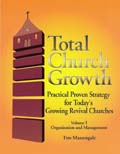
By Tim Massengale
John and Debbie Scott had high expectations as they walked down the aisle to be introduced to the congregation. A week before, John and Debbie had both received the Holy Ghost and were baptized. Now, they each testified of the wonderful change that their new experience had brought. The congregation rejoiced, obviously pleased to have this new couple and their three beautiful children become a part of the church family.
Eight months later, after those warm words of welcome, John and Debbie Scott were gone. They had not been to worship in two months and unless the Lord intervened, would probably not attend church again. They became a part of a growing number of “backsliders” that had come in the front door and, before they were really ever established, had gone out the back. There had been no falling out with the pastor or the people. There was very little conflict in doctrine or standards. The problem was that John and Debbie had never really become a part of the life and fellowship of the church. They never truly felt “included.”
Because of this, their attendance had been sporadic. They had developed few friends. They were seldom seen at church socials and picnics. Slowly they had drifted back to old habits and friends. What was worse, few people in the church even knew they were drifting away. Now, John is somewhat bitter. He feels the church is “cliquish” and unfriendly. Debbie thinks the standards are unreasonable and the pastor is narrow minded.
What happened? Why did this seemingly happy marriage between two new Christians and the Lord end in separation and divorce? And more important, is there something the church could have done that might have kept it from happening?
The answer is most likely “yes.”
The above example happens too often. Souls come in the front door and the quietly slip out the back. We must change this endless cycle of futility. We must begin to think differently as well as act differently. Churches must stop thinking and acting like “Bo-Peep,” and instead, begin thinking and acting like the “Good Shepherd.”
The Good Shepherd is the one who – even with ninety-nine in the fold – went out into the rough, rocky places to seek for the one sheep that was lost. The Good Shepherd refused to give up until the stray little one was brought back into the fold. Every lamb that was born was important. Every sheep was loved and cared for.
In contrast, the Bo-Peep church believes exactly what the poem indicates: “Little Bo Peep has lost her sheep and doesn’t know where to find them. But leave them alone and they’ll come home wagging their tails behind them.”
In taking this stance, saints are often heard to say, “Well, they know the truth. If they want it they know where to find it.” How sad! They have become “Bo-Peep” churches in a “Mother Goose” fantasy land that does not feel or see the hurts and needs of new converts.
New convert retention must become a top priority of the church! It does little good to place our total focus upon outreach when we are losing people as fast as we gain them.
The New Testament Example
The New Testament church began with explosive growth. There was over 3,120 converts the very first day. That’s a lot of new babies! It had to be the work of the Holy Ghost to inspire the Apostles on how to establish these new Christians.
The writer Luke records that after the three thousand were baptized, the new converts continued steadfastly in three areas (Acts 2:41-47): First, instruction (vs. 41, 42, & 46). Secondly, fellowship (vs. 42 & 46). And thirdly, unity of involvement (vs. 44 & 45)
Each of these are extremely critical to the growth of a new convert. If any of the three areas are neglected, the convert will suffer.
Some might argue that the new convert is covered in these areas simply by attending regular services. This may be true in a general sense, but new converts have special needs that are inadequately met by only a normal service. That would be like saying, “What mom fixes for the rest of the family is sufficient for her newborn baby.” This is not true. Babies have certain needs which adults do not. These special needs must be met or the child may suffer and die.
Around the turn of the century, the infant death rate was over 30% – almost one third of the babies born in the world died the first year. Infant diseases such as small pox, scarlet fever, influenza, and others took a heavy toll. Today, the death rate in America less than 5%.
Why? Do mothers today love their babies more now then back then? No! The simple fact is, we have learned to care for newborns better. Many babies that would have died fifty years ago are being saved today through advancements in medical science. Superior pre-natal and post- natal care practices have greatly increased their survival rate. The same applies to the church. If we will learn to take better care of our new converts, we will see more solid, established Christians. Let’s take a closer look at these three basic needs.
Instruction
When an individual comes to our altars and receives the Holy Ghost or is baptized, they begin their new life much like a new born infant – very weak, very hungry, and very dependent upon their mother. They do not know how to live for God, how to pray, how to study the Word, or how to fight temptation. Someone must train them; someone must teach them – and that someone is us! If we abandon the newborn, it will not take long for them to die. You can be sure that the devil is going to do everything he can to make them stumble and fall. Somehow we must give them nourishment and provide the protection that will deter the devil’s attack. There are three basic steps we should consider taking to provide this needed instruction:
First Week Counseling – The week after someone receives the Holy Ghost or is baptized, someone should sit down with them and go over some basic concepts of living for God — like church attendance, daily prayer and Bible reading, and overcoming Satan’s attack. It is also good to give them a new convert’s booklet or audio CD that covers these topics in more detail.
New Life Class – a class taught at the church on Sunday morning using a good curriculum like In My Father’s House. Converts should be strongly encouraged to attend.
Home Bible Study – all converts should be taught a 12-week Search For Truth or Exploring God’s Word course in their home. This is important. Start this immediately.
Fellowship
Fellowship is the second most important key in binding new members to the church. The stronger the friendship bond that the convert builds, the more assured you can be that the convert will be a long-lasting Christian.
Several revealing research studies have been conducted on this “friendship factor.” One such study found that the number of close friends a convert develops has a direct relationship to that person staying in church.
How can we encourage converts to make friends in the church? One way is to assign each convert a ‘care partner’ or ‘spiritual parent’ to work closely with the convert the first year. This is often the person that brought the convert to the Lord. This care partner will attend the New Life Class with them, teach them the Home Bible Study, check on them when they miss church, and help them make new friends.
A second way to encourage new friends is with an organized ‘Fellowship Ministry’ program. Each month a different family in the church is asked to spend time and fellowship with an assigned new convert. They are given a list of suggested activities they might consider doing with the convert. By the end of the first year, the convert has made many new friends in church.
A third way is to plan new convert socials for all converts and care partners at least quarterly. It has been found that converts often make friends easily with other new converts.
The key element here is to break down the “cliques” that so easily develop among church members. It is next to impossible for the convert to break into these social groups by themselves. You must help provide the avenue for them to feel a part of the body and to establish the lasting, meaningful relationships that are so essential to their spiritual and social health. Without it, the convert will soon parish.
Involvement
Involvement is the third important need of new converts. Research has conclusively shown that people who leave the church rarely were involved in any meaningful way. Involvement gives a feeling of self-worth. It says, “I’m needed, I’m important, I’m a part.”
Few churches provide ample opportunity to their converts for meaningful involvement. An unfortunate concept in many Pentecostal churches is to tell the converts, “Sit on the pew for a year and prove yourself. When you are more mature in the Lord, then we’ll use you.” What this is actually doing is teaching the new convert to sit and do nothing. The task need not be great, nor should it involve any leadership responsibilities, but it should let them know that their talents and abilities are useful to the work of God. The old saying, “use them or lose them” is well applied here. Someone who is pulling on the oars has little time to rock the boat.
In Conclusion
If God were to send a great revival to your city and a hundred people received the Holy Ghost, could your present New Convert program handle it? Do you even have such a ministry? This is a question every church needs to ask itself.
If God actually gave you the end-time revival that you have been praying so long and desperately for, could you handle it? Would the harvest be cared for or would it rot in the field?
You may not have that great revival yet, but to wait until it arrives is to wait too late. What if your city waited until a fire broke out to hire firemen and look for fire trucks? How long do you think your mayor would keep his job? Keeping that in mind, what do you think God thinks of us? Someone has aptly said, “God is not in the business of making backsliders.”
The Lord of the Harvest sees little benefit in sending you a hundred-soul revival when ninety of them will end up backsliding. Pastor, church leader, until your church can handle and absorb a hundred-soul revival, God doesn’t want you to have one. But if we will prepare now and set in motion the process needful to retain such a revival, I believe God will send you one. He wants you to have revival even more then you want to have it. Don’t you agree?
Author’s Note: If you would like more information on how to set up and manage a new convert care ministry in your local church, please call 1-800-800-0247 and request the “New Convert Care Ministry” packet. Cost is $5.00 which includes postage.




1 thought on “The Care and Keeping of Converts (Entire Article)”
Comments are closed.